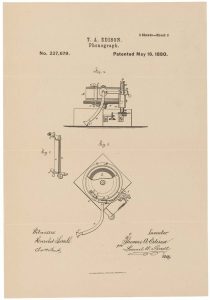
In honor of today’s 129th anniversary of Thomas Edison’s announcement of his invention of the phonograph, I thought I would share an idea that came to me this past summer. I had the pleasure of taking a course on Visual and Sound Materials taught by Tom Connors, the curator of the National Public Broadcasting Archives. This course explored the history of audio recording, photography, film and broadcasting technology.
When explaining the details of the first phonographs, Prof. Connors mentioned that certain sounds recorded better. Recordings of horns and the pitch of tenor singers were reproduced most accurately – or at least played back with the best sound. We also talked about the change in access to music brought about eventually by the availability of records at the corner store. The most popular recordings were (not surprisingly) of music with lots of horns or the recordings of individual singers like Enrico Caruso. So my question is how might music have evolved differently if different music had sounded better when reproduced by the phonograph? Would Caruso have been replaced at the top of the heap by someone else with a different vocal range? Would Jazz music evolved differently? Would there have been other types of music altogether if string instruments or wind instruments reproduced as well as the bright sounding horns?
In our class we also discussed the impact of the introduction of long playing records. Suddenly you could have 30 minutes of music at a time – with no need to have anyone playing the piano or hovering over the phonograph to change the disk. This led to the movement of music into the background of daily life – in contrast with the earlier focus on playing live music for entertainment in people’s homes. It also paved the way for people to experience music alone – you no longer needed to be in the same room as the musicians. No longer was music exclusively something shared and witnessed in a group. In my opinion this was the start of the long path that led to the possibility of having your own personal ‘sound track’ via first the walkman and now the digital audio player such as the iPod.
These ideas are still about archives and research. From my point of view it is just another example of how a different kind of context can impact our understanding of history. There are so many ways in which little events can impact the big picture. Edison wasn’t pursuing a dream of access to music (though that was included on his list of possible uses for the phonograph) – he was more interested in dictation, audio books for the blind and recording the last words of the soon to be dearly departed.
I love having the ability to examine the original ideas and intentions of an inventor and it came as no surprise to me that some of the most interesting resources out there for learning more about Edison and his invention of the phonograph traced back to both the Library of Congress and the U.S. National Archives and Records Administration. The LOC’s American Memory project page for The Motion Pictures and Sound Recordings of the Edison Companies gives a wide range of access to both background information and the option to listen to early Edison recordings. NARA’s page for the digital image above (originally found in Wikipedia) can be found online via NARA’s Archival Research Catalog (ARC) by searching for ‘Edison Phonograph’.
Hurrah for the invention of the phonograph and for all the archives that keep information for us to use in exploring ideas! Listen for horns and tenor voices in the next song you hear – and noticed if you are listening alone or with a group.
A final question: how can providing easy access to more big picture historical context help users to understand how the records they examine fit into the complicated real world of long ago?
if you are interested in learning more about the “big picture” surrounding the history of sound recording technologies you should check out this book:
http://www.amazon.com/Audible-Past-Cultural-Origins-Reproduction/dp/082233013X/sr=8-1/qid=1164143180/ref=pd_bbs_sr_1/103-5693342-1099021?ie=UTF8&s=books
i’m only a quarter way through it and it is quite engaging so far. i recommend it.
Thank you so much for the recommendation. I will definitely find a copy of it as soon as I my school assignments permit me enough time to read it!